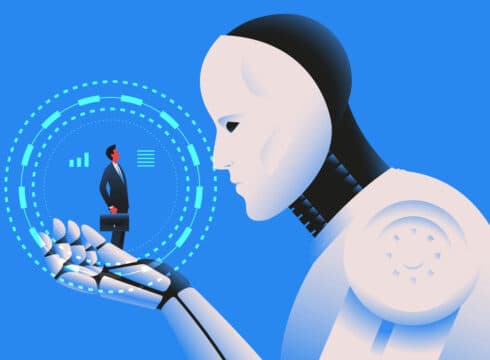In-person interviews, while integral, often fail to provide a comprehensive picture of a candidate's suitability for a role
By gauging factors such as communication skills, emotional intelligence, and problem-solving abilities, AI tools offer a holistic perspective that goes beyond the confines of a traditional resume
One of the standout advantages of AI-based interviewing tools is their capacity to generate valuable data-driven insights
Inc42 Daily Brief
Stay Ahead With Daily News & Analysis on India’s Tech & Startup Economy
In an age where technological advancements are reshaping industries at an unprecedented pace, the field of human resources is no exception. Traditional hiring processes, laden with biases and limitations, are being challenged by innovative solutions that promise to streamline and elevate the way companies identify top talent.
One example is the integration of AI-based interviewing tools into the recruitment process, which holds the potential to revolutionise hiring by enabling organisations to make more informed and unbiased decisions.
Conventional hiring processes have been marred by inherent human biases for a long time. From unconscious prejudices to snap judgments, these biases seep into every stage of recruitment, ultimately leading to suboptimal hiring decisions.
In-person interviews, while integral, often fail to provide a comprehensive picture of a candidate’s suitability for a role. The reliance on subjective evaluation criteria and the tendency to favour charismatic individuals further exacerbate the problem, leading to missed opportunities and costly turnover.
Enter AI-Based Interviewing Tools
AI-based interviewing tools emerge as a beacon of hope in this murky landscape. Leveraging natural language processing (NLP) and machine learning, these tools analyse verbal and non-verbal cues from candidates to provide objective insights into their suitability for a given role.
By gauging factors such as communication skills, emotional intelligence, and problem-solving abilities, these tools offer a holistic perspective that goes beyond the confines of a traditional resume.
One of the most promising aspects of AI-based interviewing tools is their ability to mitigate unconscious biases. These tools treat all candidates equally, devoid of any preconceived notions based on gender, ethnicity, or appearance.
This not only levels the playing field but also cultivates diversity and inclusion within the workplace—a crucial component of a thriving organisational culture.
Enhancing Candidate Experience
A company’s hiring process is a window into its organisational values and practices. Traditional interviews, with their often nerve-wracking and intimidating nature, can leave candidates feeling undervalued and apprehensive. AI-based tools, on the other hand, provide a more relaxed and familiar environment.
Virtual interviews, for instance, allow candidates to showcase their skills from the comfort of their own space, resulting in a more authentic representation of their abilities. This improved candidate experience doesn’t just lead to better hiring decisions but also enhances the company’s reputation in the eyes of potential future employees.
Data-Driven Decision Making
One of the standout advantages of AI-based interviewing tools is their capacity to generate valuable data-driven insights. Every interaction with a candidate yields a trove of information that can be analysed to identify patterns, trends, and correlations.
This data can then be utilised to refine and optimise the recruitment process, ensuring that only the most relevant and high-potential candidates progress to the next stages.
In a landscape where competition for top talent is fierce, the ability to make data-backed decisions can be the difference between staying ahead or falling behind.
The Human Touch: Balancing Technology And Intuition
Critics of AI-based interviewing tools often argue that they strip away the human element from the hiring process. They contend that human intuition, honed over years of experience, cannot be replicated by machines.
While this sentiment holds merit, it’s important to recognise that AI is not intended to replace human judgment but to complement and enhance it.
AI-based tools provide a data-driven foundation upon which recruiters and hiring managers can exercise their expertise. Instead of relying solely on gut feelings, professionals can leverage AI-generated insights to ask targeted follow-up questions during interviews, delving deeper into a candidate’s strengths and weaknesses.
This synergy of technology and human intuition paves the way for more nuanced evaluations that consider both objective metrics and personal qualities.
Overcoming Challenges And Ethical Considerations
While the potential of AI-based interviewing tools is undeniable, they are not without challenges. Ensuring the privacy and security of candidate data is paramount, as is addressing concerns related to algorithmic biases that might inadvertently perpetuate existing inequalities.
Transparent communication about the use of AI in the hiring process is essential to establishing trust with candidates and alleviating any apprehensions they might have.
The integration of AI-based interviewing tools into the recruitment process is a pivotal moment in the evolution of hiring practices. By harnessing the power of technology, companies can move away from subjective and biased evaluations and embrace a more objective and inclusive approach.
These tools not only enhance the accuracy of hiring decisions but also create a more positive and equitable experience for candidates. As businesses navigate a rapidly changing world, AI-based interviewing tools offer a compass to navigate the complex terrain of talent acquisition, ultimately leading to stronger teams and brighter futures.
{{#name}}{{name}}{{/name}}{{^name}}-{{/name}}
{{#description}}{{description}}...{{/description}}{{^description}}-{{/description}}
Note: We at Inc42 take our ethics very seriously. More information about it can be found here.


